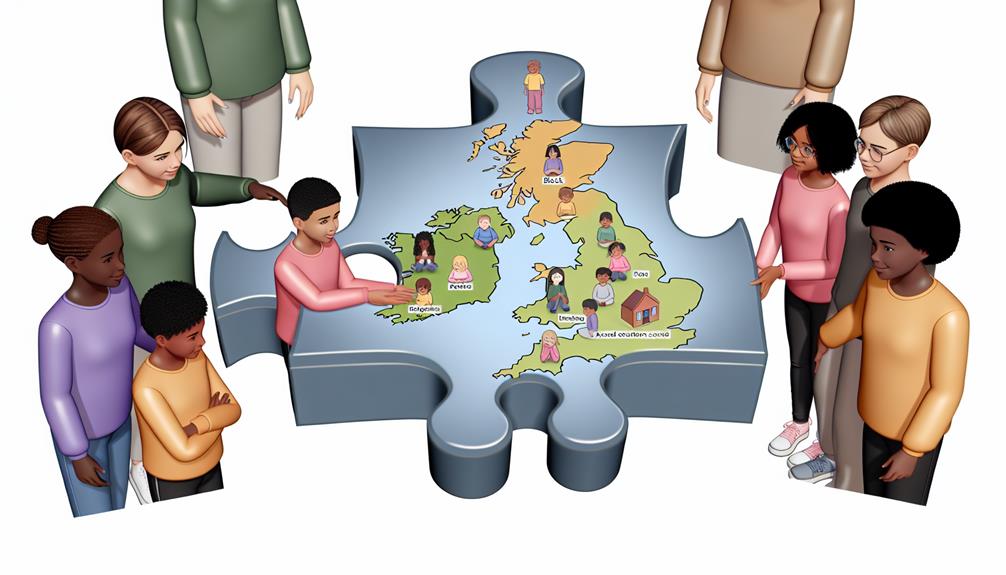Innovative shifts are transforming Britain's foster care. Improved training now covers trauma-informed care and therapeutic approaches. Modern technology, like virtual training and foster care apps, is empowering caregivers. New policies prioritize post-adoption support and kinship care, reflecting a more child-centric approach. The community plays a key role, creating a stabilizing structure for foster care transformation. These changes aim to create a more effective, compassionate system addressing the needs of those vulnerable children in a thoughtful way. There's much to explore about this evolving landscape. Stick around, there's more to discover about the future of foster care in Britain.
Key Takeaways
- Foster parent training now includes trauma-informed care and therapeutic approaches, enhancing their ability to manage children's needs.
- Technological innovations such as virtual training and foster app development are modernizing the system and improving resource accessibility.
- New policies prioritize kinship care and post-adoption support, reflecting a more child-centric approach to foster care.
- The adoption process is being streamlined to expedite placements, reducing the instability caused by a shortage of foster homes.
- Community engagement and advocacy are playing a significant role in transforming the foster care system, influencing policy and providing support.
Understanding the UK Foster Care System

To truly grasp the potential for transforming foster care in Britain, you first need to understand the complexities and intricacies of the existing UK foster care system. This system, brimming with challenges and opportunities, hinges notably on two key elements: Foster Parent Recruitment and Cultural Sensitivity Training.
The recruitment of foster parents is a cornerstone of the system. It's not just about quantity, it's also about quality. You need to find individuals or families ready to open their homes and hearts to children in need. It's about sifting through the populace to find those with the emotional resilience, the patience, the compassion, and the sheer stamina to provide a loving, stable environment for children who've often been through traumatic experiences.
Then there's Cultural Sensitivity Training. Britain, with its rich tapestry of cultures, necessitates foster parents who can understand, respect, and nurture the cultural identities of their foster children. This training is vital to guarantee a foster child's cultural heritage isn't disregarded but rather cherished and celebrated.
Grasping these aspects, you begin to perceive the system's complexities and glimpse the potential for transformation.
Challenges Faced by UK Foster Care
Traversing the maze of the UK foster care system, you'll encounter a myriad of challenges, from a chronic shortage of foster homes to the struggles of meeting diverse cultural needs. These challenges, coupled with the inadequate foster parent training, often leave foster families feeling overwhelmed and inadequately prepared.
- Shortage of Foster Homes: The demand for foster homes often far outstrips supply, leaving many children in unstable situations.
- Inadequate Foster Parent Training: Foster parents are often ill-prepared to manage the complex emotional, psychological, and behavioral needs of their foster children.
- Cultural Competency: Foster families sometimes struggle to meet cultural needs. This lack of cultural competency can lead to misunderstandings and tensions, adversely affecting the child's development and well-being.
You must remember, each challenge has a profound impact on both the children in care and their foster parents. Solutions that address these challenges head-on, and with empathy, are crucial for the success of the UK foster care system. Understanding these challenges is the first step towards effecting meaningful, lasting changes.
The Need for Reforms in Foster Care

You've seen the challenges posed by the current state of foster care in the UK.
Now, it's important to contemplate the necessity for sweeping reforms.
Through an analytical lens, you'll understand the proposed improvements that could drastically change the lives of these vulnerable children.
Current Foster Care Challenges
In the intricate maze of Britain's foster care system, there's a growing recognition that significant challenges persist, pressing the need for extensive reforms. Let's explore further into these issues.
- Foster Care Stigma: This creates obstacles for both the children and their caregivers. You'll find society often misinterprets and marginalizes these children, leading to isolation and emotional struggle.
- Caregiver Burnout: Foster parents are prone to exhaustion due to the emotional strain and lack of support. This burnout not only affects the caregiver but also the quality of care given to the child.
- Regulatory Challenges: The system is entangled in bureaucratic red tape, leading to delays and difficulties for foster families.
These hurdles demand immediate attention. Understanding them is the first step towards carving out effective reform strategies.
Proposed Foster Care Improvements
Facing these challenges head-on, it's clear that the British foster care system urgently needs thoughtful, all-encompassing reforms to better support both the children and their caregivers. Foremost, attention must be given to bolster Foster Parent Training, ensuring that carers are equipped to provide the right nurturing environment. Training should include trauma-informed care and therapeutic approaches, to address the complex needs of children in care.
Adoption Processes also need streamlining to avoid prolonged stays in foster care. Reducing bureaucratic red tape and enhancing support for prospective adoptive parents can expedite the process. By focusing on these key areas, you're not just improving a system; you're fostering a better future for Britain's most vulnerable children. The time for action is now.
Technological Innovations in Foster Care
Over the past decade, we've witnessed a significant shift in the foster care system, largely driven by technological innovations that aim to improve the experiences and outcomes for children and their foster families. Virtual Training and Foster App Development stand out as game-changers, revolutionising the way foster care operates.
- Virtual Training: This technology has empowered prospective foster parents with the knowledge and skills they need to care for children. Through interactive, online modules, you're able to understand the complex needs of foster children and strategies to support them.
- Foster App Development: These apps are making a world of difference. They offer resources, provide a platform for communication between foster parents and social workers, and even track a child's progress.
- Data Analysis Tools: These tools help social workers to analyse data about children in foster care, predicting their needs and improving their outcomes.
These innovations are transforming the foster care sphere, driving efficiency, and enhancing the quality of care. But it's important to remember, technology alone can't solve all the challenges. It's the human touch, your empathy, and commitment, that make the real difference in a child's life.
New Policies Impacting Foster Care

Exploring the maze of new policies impacting foster care, you'll uncover a plethora of changes designed to improve the system's effectiveness and children's wellbeing. These policy shifts have ushered in a new era of Foster Parenting, one that emphasizes training and support, ensuring parents aren't simply caregivers, but advocates for their foster child's needs.
One remarkable policy is the expansion of post-adoption support services. This key move has greatly contributed to Adoption Success, providing much-needed resources to families post-placement, leading to more stable and lasting placements. You'll find that the government has become more proactive in acknowledging the challenges both foster parents and adoptive families face, demonstrating a clear commitment to their success.
Furthermore, the introduction of policies that prioritize kinship care, where children are placed with relatives or close family friends, highlights the importance of maintaining familial bonds.
These innovative policy shifts are a sign of the importance the government places on the wellbeing of children within the foster care system. They reflect an empathetic, child-centric approach that places the needs of the child at the heart of the system. It's clear that these changes are creating a more effective, compassionate foster care system in Britain.
The Role of Community in Foster Care Transformation
Often, it's in the arms of a supportive community that the transformation of foster care truly takes root. This is where community engagement and caregiver support become pivotal. You see, a community can provide a stabilising structure, a shared sense of responsibility, and a collective voice that can influence policy.
Consider these three aspects:
- Stabilising Structure: A community's infrastructure can offer a strong network of support, not only for the foster child but also for the caregiver. This could be through local services, resources, or just a listening ear.
- Shared Responsibility: Fostering isn't a solo task. It's a collective effort. The community shares the responsibility of ensuring the child's well-being, which makes the caregiver's role less isolating.
- Collective Voice: An engaged community can advocate for better policies, more resources, and greater respect for foster care.
Impact of Foster Care Innovations

You're now stepping into the domain of foster care innovations and their impact on the system.
It's important to understand how technological advancements can revolutionize the way foster care is administered.
Similarly, we'll consider how policy changes can enhance the quality of care, shaping a better future for these vulnerable children.
Technological Advancements in Foster Care
Amidst the complex challenges of the foster care system, technological advancements have emerged as a beacon of hope, greatly transforming how foster care is delivered and experienced in Britain.
Key innovations include Digital Training and Foster Apps.
- Digital Training: This offers foster parents real-time, accessible education on key issues, enhancing their ability to provide effective care.
- Foster Apps: These apps provide a digital platform for foster parents, children, and professionals to connect, share experiences, and access resources.
- Data Analytics: Sophisticated data analysis tools are now being used to improve placement matches, predict outcomes and identify areas of need.
These innovations aren't just improving the system, they're revolutionising it, providing you with the tools and knowledge to make a real difference in the lives of children in care.
Policy Changes Enhancing Care
Now, let's consider how the impact of these innovations in foster care is being strengthened by recent policy changes in Britain. Enhanced caregiver support and foster parent training are now pivotal to these policies. These changes facilitate better care for children in the foster system.
Basically, you're expected to be more equipped and supported in your role as a foster parent. The government recognizes that strong training is vital to make sure you're prepared for the demands of fostering. Additionally, they're providing stronger caregiver support networks to help you navigate challenges.
These policy changes aren't just reshaping the landscape of foster care in Britain, they're setting a new standard. They empower you to provide the highest level of care, ultimately leading to better outcomes for children in foster care.
Looking Ahead: The Future of UK Foster Care
Looking towards the horizon of UK foster care, it's evident that significant changes and improvements aren't only necessary but crucial, to secure a brighter, more stable future for our foster children. As someone keen on mastery, you'll appreciate that the innovative shifts will focus on enhancing Foster Parenting Experiences and refining Adoption Pathways.
- Foster Parenting Experiences: Training, support, and compensation will be revamped to attract and retain high-quality foster parents.
- Adoption Pathways: Streamlining the adoption process will expedite placements, reducing the emotional strain on children and potential adoptive parents.
- Technological Innovations: Utilising digital platforms for training, support, and matching children with suitable families will increase efficiency and effectiveness.
Frequently Asked Questions
How Does the UK Foster Care System Compare to Foster Care in Other Developed Countries?
UK's foster care system stands out with high adoption rates and an emphasis on cultural sensitivity, compared to other developed countries. It's a promising model that's paving the way for meaningful reform worldwide.
What Are the Most Common Reasons Children Enter Foster Care in the Uk?
You'd find that neglect, abuse, and family dysfunction are common reasons kids enter UK foster care. Preventive measures and robust foster training are essential to addressing these issues and improving the child's life circumstances.
How Does the UK Government Support Foster Parents Financially?
In the UK, you're supported as a foster parent through Foster Allowances, covering the child's needs. Plus, you're eligible for Tax Reliefs, reducing your taxable income. It's a system designed to ease your financial responsibility.
Are There Any Notable Case Studies of Successful Foster Care Transformations in the Uk?
Yes, you'll find inspiring instances, like Leeds' transformation strategy, leading to a 49% reduction in care entries. Their focus on adoption success is a prime example of successful foster care transformations in the UK.
How Does the Foster Care System in the UK Address the Mental Health Needs of Foster Children?
In the UK, you'll find that the foster care system addresses the mental health needs of children through therapeutic interventions and counselling services, providing them with the support they need to overcome their challenges.
Conclusion
As we navigate the complexities of foster care, it's clear that innovation and community involvement are crucial components. Technological shifts and policy reforms, standing starkly against the previous challenges, are revolutionising the system, promising brighter futures for children in care.
But remember, these are only as strong as the communities that embrace them. Let's continue to support and participate in this transformation, as it shapes the future of foster care in the UK.




